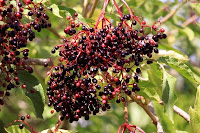Travelling can sometimes be complicated. Depending on which country you are intending to visit and how long you are going to stay there, you will have to become familiar with diseases and infections which you might come into contact with. In order to protect your health and well-being while on the road, in the air, or on the sea, there are a few supplements and herbal medicines which come in handy. Check with your naturopath and your doctor before you leave, making sure you have all the vaccinations and supplements that you might require.
Echinacea
Echinacea (E. angustifolia, E. purpurea) is a North American herbal medicine which has gained world-wide acclaim as a immune stimulant and modulator par excellence. When travelling to distant lands, there are few herbal remedies that will match Echinacea for providing both protection and treatment. In 2012 Griffith University in Australia published a placebo-controlled, double-blind clinical trial on air travellers taking Echinacea extract tablets (produced by Australian manufacturer Mediherb) Participants who took the Echinacea tablets before and during their air travel experienced significantly fewer upper respiratory infections, and the positive effects of Echinacea lasted
up to four weeks after their flights.
Other studies have found that Echinacea was active against both swine flu and bird flu, helping to inhibit the replication of the virus while also interfering with their ability to bind to receptor sites. Echinacea is equally as effective against medication-resistant bacteria, such as MRSA, as it is against regular viruses.
Probiotics
Probiotics are steadily gaining in popularity around the world as research continues to find new health benefits from using them. Taking probiotics improves digestion, raises mood levels, and stimulates immune function. And when travelling overseas, it is possible that taking probiotic supplements may lend some protection against bacteria that cause traveller's diarrhoea. In a 2008 survey on people suffering from traveller's diarrhoea, researchers found that
up to 23 percent of people who experienced traveller's diarrhoea self-medicated with probiotics. That's more than double the number of people who chose antibiotics as their main treatment option.
In a review of research published in World Journal of Gastroenterology, probiotics containing strains of Saccharomyces boulardii were found to be significantly effective for a range of digestive problems, including traveller's diarrhoea. Other probiotic strains, such as Lactobacillus rhamnosus and Bifidobacteria are mentioned also in the study as being effective. Because probiotics are incredibly sensitive to heat, ask your naturopath, health store retailer or pharmacist about which brands are travel-friendly.
Sweet Wormwood
Sweet Wormwood (Artemisia annua) is an age-old herbal medicine in Traditional Chinese Medicine (TCM) that has received enormous scrutiny from the scientific community since the 1970's, when its active constituent artemisinin was discovered. Artemisinin is incredibly anti-malarial, with a similar toxicity to malaria parasites as prescription drugs such as quinine. By itself, artemisinin is not well absorbed by the body. Often doctors will prescribe artemisinin to be taken alongside other analogs of artemisinin, such as artemethar, which have been chemically changed to increase their bioavailability.
A study published in Molecules in 2010 suggests that other flavonoids present in the leaves of Sweet Wormwood may enhance the bioavailability of artemisinin, creating a synergistic action when the whole plant extract is used. Findings like this confirm the benefit of taking Sweet Wormwood in the form of a herbal tea to prevent a malarial infection -- as TCM has recommended for thousands of years.
Ginger
Ginger root (Zingiber officinale) is one of the most ancient traditional remedy for improving digestion and reducing nausea in the world. Despite it's long history of use, scientists are only beginning to understand how it works in the last 20 years. Ginger root reduces nausea from nearly every conceivable cause: pregnancy, chemotherapy, infectious disease, digestive illness, and motion sickness.
The American Journal of Physiology published a double-blind, randomised placebo-controlled study in 2002 that showed Ginger root significantly reduced motion sickness in participants when motion sickness was artificially induced. Whether you use Ginger tea, Ginger tablets or liquid Ginger extract, it's a handy herb to keep on hand when travelling by sea, air or car, if you know you have a sensitive stomach.
Andrographis
Andrographis (A. paniculata) has a range of benefits that may make it an appealing choice for travellers, depending on where they are going and what sort of diseases they are concerned about. If you know you are going away, Andrographis is a fantastic herbal extract to take to support immune function and stimulate your defences in general. Both the whole plant extract, and its isolated constituents called andrographolides, are active against bacteria and viruses responsible for respiratory illnesses such as tonsillitis and the common cold.
Andrographis may also offer protection against malaria. According to a study published in Alternative Medicine Reviews in 2011, Andrographis has shown activity against two different strains of malaria parasites, including plasmodium berghei and plasmodium falciparum. In addition, the roots have shown adaptogenic, antioxidant, anti-protozoal, antiparasitic, antibacterial, and antifungal properties. One clinical study in China showed that ethanol extract tablets of Andrographis helped to cure 88 percent of dysentery cases, and 91 percent of acute gastroenteritis cases.






